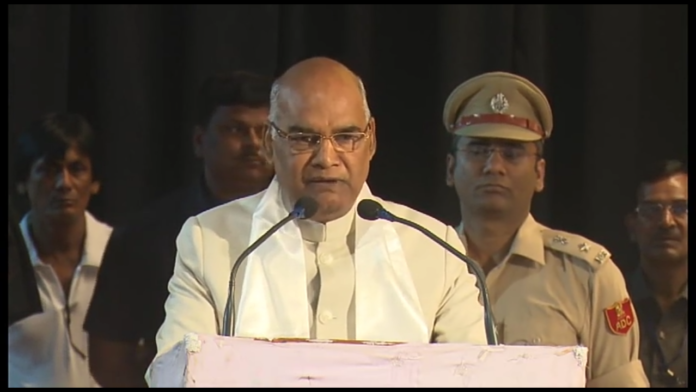President Ramnath Kovind on Tuesday said that the poor suffer the most when it comes to health and therefore medical science could not afford to profiteer from society.
“As doctors, your services must be available both to those who can afford your fees and also to those who are less fortunate and cannot afford. Disease does not distinguish between rich and poor but unfortunately poor suffer the most. It is for society to profit from medical science – it is not for medical science to profiteer from society,” Kovind said while addressing the 45th Convocation of the All India Institute of Medical Sciences (AIIMS), New Delhi. The President awarded degrees to 572 graduating students from AIIMS at the function.
He added that it is the need of the hour to remove regulatory bottlenecks in medical education so that India has enough doctors to take care of its burgeoning population.
“Currently our medical colleges, whether run by the government or private institutions, have only about 67,000 undergraduate seats and 31,000 postgraduate seats. In a country of 1.3 billion people this is highly inadequate. We have to overcome regulatory bottlenecks and interest groups that have prevented the growth of quality medical education in our country. This gives us far fewer medical graduates and postgraduates every year than our people need. It also leads to aspiring medical students seeking admission in colleges in other countries – simply because they have limited options at home. This is simply not acceptable,” Kovind said.
The comments come even as the government’s attempt to change the structure of medical education regulation through the constitution of a National Medical Commission to replace the Medical Council of India is currently under scrutiny of the Parliamentary standing committee of health and family welfare.
In his speech, health minister J P Nadda referred to the effort without actually mentioning the contentious Bill. “To address these challenges we have undertaken reforms like setting up of more medical and nursing schools, introduction of National Eligibility cum Entrance Test (NEET) to get rid of
multiple entrance exam and ensure greater transparency and better standard, reforms in MCI and DNB
regulations have helped in taking the total number of PG and DNB seats to more than 37,000, to name a few”, Nadda said. The Bill’s provisions of a largely nominated regulatory body, a bridge course for AYUSH practitioners to prescribe modern medicine and an exit examination for doctors has caused great agitation among doctors and the Indian Medical Association had called a strike.
Describing India as a “country of paradoxes”, Kovind said that nowhere is this more apparent than in our public health.
“Traditional challenges such as diarrhoea, pneumonia and TB – along with maternal and child mortality figures that are improving but are still worrying – are a concern. On the other hand, non-communicable diseases and what are called life-style diseases are emerging as big killers. These could be related to the heart or to the brain, as well as to a host of cancers and pollution sources that we are increasingly exposed to,” he said.


